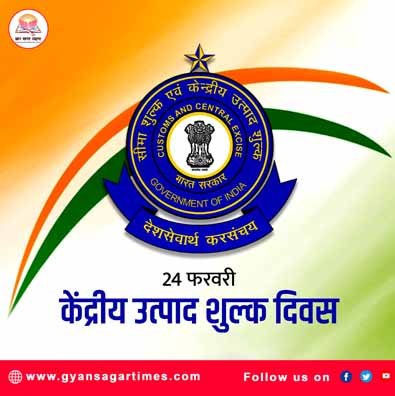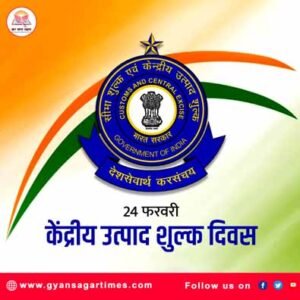
केंद्रीय उत्पाद शुल्क दिवस
भारत में केंद्रीय उत्पाद शुल्क और इससे जुड़े कराधान प्रणाली के महत्व को चिह्नित करने के लिए मनाया जाता है. यह दिवस केंद्रीय उत्पाद शुल्क विभाग और इससे जुड़े अधिकारियों, कर्मचारियों और करदाताओं के योगदान को सम्मानित करने का अवसर प्रदान करता है. यह दिन भारत की कर प्रणाली में उत्पाद शुल्क की भूमिका और इसके विकास को रेखांकित करता है.
उत्पाद शुल्क का इतिहास भारत में ब्रिटिश शासन काल से जुड़ा हुआ है. ब्रिटिश सरकार ने भारत में उत्पाद शुल्क की शुरुआत की थी, जो मुख्य रूप से निर्मित वस्तुओं पर लगाया जाता था. 24 फरवरी 1944 को भारत में पहली बार केंद्रीय उत्पाद शुल्क अधिनियम लागू किया गया था. इसलिए, इस दिन को उत्पाद केंद्रीय शुल्क दिवस के रूप में मनाया जाता है. इस अधिनियम का उद्देश्य देश में उत्पादित वस्तुओं पर कर लगाना और सरकार के राजस्व को बढ़ाना था.
उत्पाद शुल्क एक प्रकार का अप्रत्यक्ष कर है, जो भारत में निर्मित वस्तुओं पर लगाया जाता है. यह कर वस्तु के निर्माण या उत्पादन पर लगाया जाता है, न कि उसकी बिक्री पर. यह कर केंद्र सरकार द्वारा लगाया जाता है और इसका संग्रहण केंद्रीय उत्पाद शुल्क विभाग द्वारा किया जाता है. उत्पाद शुल्क का मुख्य उद्देश्य सरकार के राजस्व में वृद्धि करना और आर्थिक विकास को बढ़ावा देना है.
यह दिवस कर प्रणाली के महत्व को उजागर करता है और करदाताओं को कर के प्रति जागरूक बनाता है. इस दिन करदाताओं को उनके योगदान के लिए सम्मानित किया जाता है, जिससे उन्हें कर भुगतान के प्रति प्रोत्साहन मिलता है.
यह दिन केंद्रीय उत्पाद शुल्क विभाग के कर्मचारियों और अधिकारियों के कठिन परिश्रम और योगदान को सम्मानित करने का अवसर भी प्रदान करता है. इस दिवस के माध्यम से कर सुधारों और नई नीतियों के बारे में जागरूकता भी फैलाई जाती है.
उत्पाद शुल्क मुख्य रूप से तंबाकू, पेट्रोलियम उत्पाद, वाहन, इलेक्ट्रॉनिक्स और अन्य निर्मित वस्तुओं पर लगाया जाता है. वर्ष 2017 में भारत सरकार ने जीएसटी (GST) लागू किया, जिसके बाद उत्पाद शुल्क को जीएसटी में समाहित कर दिया गया. हालांकि, पेट्रोलियम उत्पाद और शराब आदि पर अभी भी उत्पाद शुल्क लगाया जाता है. वहीं, उत्पाद शुल्क विभाग ने कर संग्रहण और कर चोरी रोकने के लिए कई आधुनिक तकनीकों को अपनाया है, जैसे कि ई-गवर्नेंस और डिजिटल प्लेटफॉर्म.
उत्पाद केंद्रीय शुल्क दिवस भारत की कर प्रणाली में उत्पाद शुल्क के योगदान को रेखांकित करता है. यह दिन करदाताओं और कर विभाग के कर्मचारियों के प्रयासों को सम्मानित करने का अवसर प्रदान करता है. साथ ही, यह कर प्रणाली में पारदर्शिता और दक्षता को बढ़ावा देने का प्रयास करता है. इस दिवस के माध्यम से करदाताओं को कर के प्रति जागरूक बनाने और कर संग्रहण प्रक्रिया को सुगम बनाने का संदेश दिया जाता है.
========== ========= ===========
Central Excise Day

Excise Central Duty Day is celebrated to mark the importance of central excise and its associated taxation system in India. This day provides an opportunity to honour the contribution of the Central Excise Department and its associated officers, employees, and taxpayers. It underlines the role of excise in the tax system of India and its development.
The history of excise duty is linked to the British rule in India. The British government introduced excise duty in India, which was mainly levied on manufactured goods. The Central Excise Act was enacted for the first time in India on 24 February 1944. Therefore, this day is celebrated as Excise Central Duty Day. The purpose of this Act was to tax the goods produced in the country and increase the government’s revenue.
Excise duty is a type of indirect tax, which is levied on goods manufactured in India. This tax is levied on the manufacture or production of the item, not on its sale. This tax is levied by the Central Government and is collected by the Central Excise Department. The main objective of excise duty is to increase the revenue of the government and promote economic growth.
This day highlights the importance of the tax system and makes taxpayers tax-conscious. On this day, taxpayers are honoured for their contribution, which encourages them towards tax payments.
This day also provides an opportunity to honour the hard work and contribution of the employees and officers of the Central Excise Department. Awareness about tax reforms and new policies is also spread through this day.
Excise duty is mainly levied on tobacco, petroleum products, vehicles, electronics and other manufactured goods. In the year 2017, the Government of India implemented GST, after which excise duty was subsumed into GST. However, excise duty is still levied on petroleum products alcohol etc. At the same time, the Excise Department has adopted many modern technologies, such as e-governance and digital platforms, to collect taxes and prevent tax evasion.
Excise Central Duty Day underlines the contribution of excise duty to India’s tax system. This day provides an opportunity to honour the efforts of taxpayers and employees of the tax department. Also, it seeks to promote transparency and efficiency in the tax system. Through this day, the message is given to make taxpayers aware of tax and to facilitate the tax collection process.





